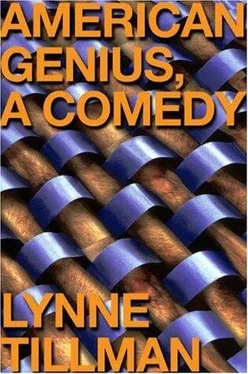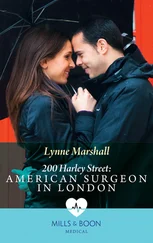The Magician displays a quarter and sets it on the table near me. I look and then hear him say something and it's gone. The quarter's gone. "It's under the plate. Move it," the Count demands. The Magician pushes the plate slightly and says, "No, see, it's not." Then the Magician produces three more quarters and moves them around on the table, he slides them effortlessly, one after another, like baby silver mice, through his fingers, he holds them up to show the table, while he asserts: "I'm not good at doing magic acts, I'm really bad at it, but I belong to the International Brotherhood of Magicians, I don't know how they let me in, and the American Society of Magicians, and to the Magic Castle in L.A., it's been there in Los Angeles since 1906. But I'll make mistakes, so watch me very closely, I'll make a mistake, but do you know anything about physics, because there's a theory about the third dimension that. " As he talks, boldly and fast, he walks around the table, stopping at each chair, to demonstrate to each of us that the coins are real, he has us touch them and look at them, he bites all of them, after which most at the table wipe their hands and mouths, and, when he sits down again, having performed his patter without a lapse, he pulls out, from his sleeve or pocket, I can't tell, several items.
— Anyone missing anything? the Magician asks.
Each of us pats our pockets, even if we don't have any, looks down and up, looks at him, and then at each other. He sets on the table the Count's Breguet pocketwatch, Spike's hemp purse, the Turkish poet's slim purple notebook, Contesa's dark glasses, Arthur's and Henry's 1960s designer wristwatches, and my silver Bauhaus button I carry in my pants pocket. Everyone gasps, but the Count looks as if he might faint, too.
— What about the coins? Spike asks.
— I can do that another time.
— I hate being manipulated, numbers never do that, Spike says.
— I applaud it, the Turkish poet says.
— Jean Cocteau would choose the thief over the cops, says Arthur.
— I'm not stealing, ladies and gentlemen, I'm just showing you that the hand is faster than the eye.
— It's amazing, I say.
— You distracted me, says the Count.
— I practice the art of misdirection, I told you that, the Magician reiterates.
The Magician remains calm, but the Count fidgets in an active state of confusion that I'd never witnessed in him, he could jump out of his skin, but Contesa addresses him, talks softly, and strokes his arm. He pulls himself together and asks the Magician to hand over his treasured Breguet, and, with its return, his demeanor rejigs, but he must now experience the Magician as an enemy or an obstacle to his peace of mind, which was just shattered, while Contesa, though not delighted by the Magician's attitude toward spirits, asks to speak with him privately, later, and gracefully excuses herself from the table and leaves the room. The head cook, who rarely steps into the dining room, she keeps to her domain, except for special occasions or holidays, when she takes our applause for an elaborate meal, which she cooked for us when she wished to be home with her husband and grown children, if they're still on speaking terms, is now among us. She claims the room's attention by clanging a small triangle. Her long apron wears stains of recent meals, including splatters of the kitchen helper's blood, so I have to avert my eyes, otherwise I'll become lightheaded again. Finally, when everyone stops speaking, except the stout Wineman who is mostly audible throughout, she says she's very, very sorry for the commotion, that the kitchen helper is fine and probably won't need stitches, and we should just pretend it never happened. "Please pretend it never happened," she repeats, and her hands flutter absentmindedly. My tablemates shrug, their shoulders shunting off the immediate past, but I've never been able to pretend something never happened.
The Magician touches my shoulder, "Watch this, Helen," he demands, and sets a playing card in front of me. He moves it around on the table, lifts both his hands, and, in that instant, the card disappears. His sleeves are up, they're well above his bony elbows, often an unattractive part of the body, often plastered with elephant skin, psoriasis is frequently found there, and the card has vanished.
— Thanks, that's terrific, just what I needed, I say.
He looks into my eyes, nakedly taking my measure, and it's a little weird, as if he has imperceptible sightlines into me, but it's not creepy, because his eyes are warm, like the friendly dog's up the street.
— I'm glad, Helen, because the truth is, I'm not going to be here long, it's a pit stop, so to speak.
The Magician continues to look at me but in an especially kindly way and appears to have reached a decision.
— You know, I have a feeling about you, I'd like to get to know you better, as a friend, he explains, with some urgency.
While this is unnerving, it is also pleasant and a surprise, since he has seen something in me that I don't see in myself, I'm sure, but instantly I hope he isn't going to compromise me in some way or make my time here more complicated than it already is, become too demanding, or like a rejected suitor be disappointed and want to harm me. We all saunter into the main lounge for after-dinner talk and drinks, offered by the staff, who serve us with a casual propriety, and then the Turkish poet bundles my arm in his, whisks me away, and asks, "You are truly all right?" because he's nervous for me, since people don't faint "hugely in these times," and, while patting my back solicitously, observes, "You are 19,h century woman in trousers." It's a funny idea, he's wrong, I feel no kinship to the 19,h century, except that it preceded and fomented reaction in the 20th, whose difficult progeny I am, but then I remember my Polish cosmetician, who wouldn't say that, and instead would repeat in her thudding English, "Your skin is very sensitive," then she'd slather cream on my face and tell me to close my eyes, while moving her fingertips lightly across my cheeks, forehead, and chin, never touching the thin skin beneath my eyes, which is too fragile even for her trained touch. "A sexual act is perforce and perchance a fainting," the Turkish poet stage-whispers dramatically, as we are joined by Spike and the Count who sit close to us. The fire rages. The Count hears the Turkish poet's commentary, and, from his store of knowledge, pulls out, like a rabbit, the word faineant, an adjective, which means given to doing nothing, of which I am frequently guilty, but it's also close to feigning, faignant, from the French for idler, he explains, and faindre, to feign. "It's the word closest to fainting in most good dictionaries," the Count says, after which Spike adds that John Cage became an expert in mushrooms, since it was the word in the dictionary closest to music, so Cage kept seeing it, became intrigued and maintained an interest for life. Spike, too, may often look at the M's because she is a mathematician. The Count strolled along the Seine and saw an antique blue watch, fell in love with it, and still loves and collects timepieces, Contesa read Kafka's Amerika and, because he hadn't visited it, she fell in love with his writing and mind, next with his brilliant cat-and-mouse letters to Felice, who may be Contesa's Amerika, because she couldn't visit her even in letters, whose symmetry she might enjoy, but I don't remain faithful long to my person, others, and my interests, except I have habits, but I resent them.
The present into which I've landed from my swoon might be a fine one, I feel this maybe illogically, having just returned from the oneiric empire and been released here, so I can listen to other voices, while the fire throws heat on my sensitive skin, it prickles, but I want more, sensation of any kind. I don't actually mind fainting, except for the feeling of added pressure or weight on my heart, fainting is a habit about which I have no choice, when I lose consciousness, which relieves me in the moment from worse sensations or in short consciousness. But the Count takes out his Breguet and announces, "It's time." Even where our days and nights are relatively unstructured, it's always time for something, with too much or too little of it, everyone complains, then asserts, it may be my time, or I had my time, but what would that have been, yet it's said people live beyond their time, which seems on the face of it a worthless idea, I don't know what it serves, like a cheap design. A neurotic often realizes it is better to live in time, and some of the residents cajole each other, Be present to your experience, get over it, get past it, or just move on, metaphorical phrases that proselytize a physical approach to static mental conditions, practical if mostly useless. The staff encourages the residents similarly with ambiguous regulations and rules that rest on flexibility, except no one knows when that relaxation will occur: for instance, the inventor was allowed to be with his dog when I couldn't bring my young wild cat, and they probably know he dropped his jeans and exposed his rosy ass, and nothing happened, but if the demanding man did it, his act might incur a negative reaction from the administration. Certain fellows' complaints are handled by the staff but others they expect the residents to sort out among themselves, but none of us knows exactly why, since their reasons and rationales are their own, and while we are encouraged also to be ourselves and to be inquisitive, there are some things we must accept, because that is the way things are, it is life. If I could cleanse myself of memory, I would, if I could abandon the sensible or rational world, I would, I'd like to, I think I'd like to. I'd also like to be unafraid and full of faith, like Samantha, who was here two years ago, who followed various teachers to the ends of the earth and never again returned to our ordinary one. Instead she wanders, untethered from any single person or place, in a dayto-day existence of happenstance. If I could, I might be able to pretend that our cat and my dog had found good homes, that beloved dead friends hover like guardian angels or are alive, which happens in dreams, and that I'm not alone and without purpose, subject to forces bigger than myself, about which I have no choice. At my mother's grand age, with her damaged brain, whose irascibility none can predict, her memory's extraction occurs daily, but she forgets and remembers the same things, so even loss has a pattern. She never forgets her husband, my father, only that he is dead and not waiting for her in his car, she forgets she killed our cat and my dog, she forgets my brother or remembers him as a child, she remembers her mother, whom she believes was perfect, and when she awakens from a dream, she's believes she's in prison, trapped in an apartment that is not hers, and nothing reassures her.
Читать дальше












